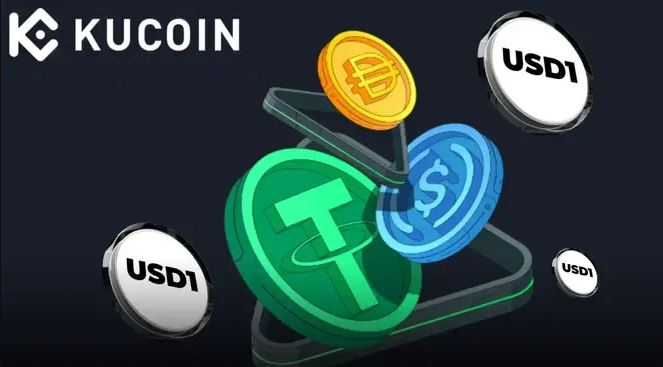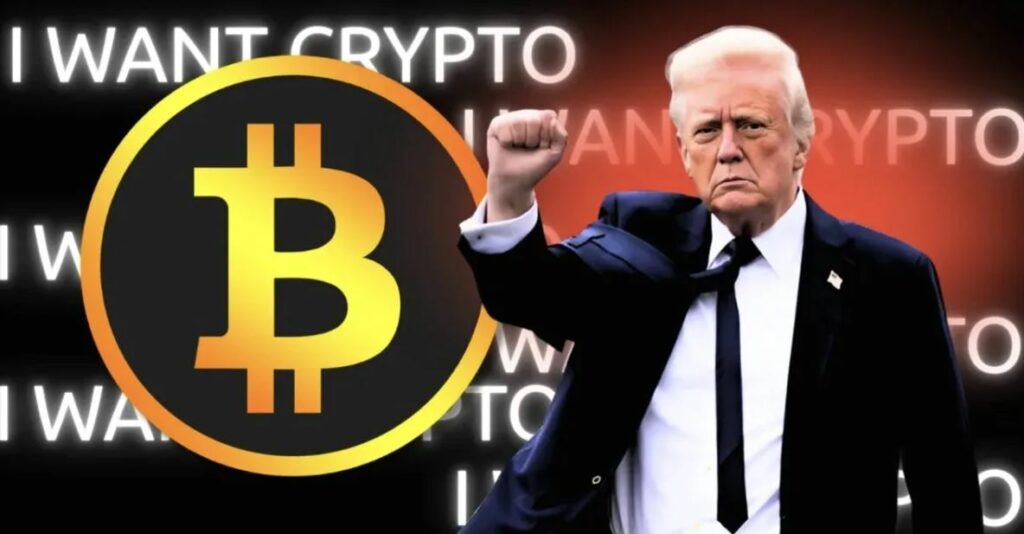
Former President Donald Trump’s newest venture into the cryptocurrency world is already causing waves—this time for its unexpected partnership with KuCoin, a crypto exchange recently fined $300 million and banned from the U.S. market. The controversial move brings attention not only to Trump’s expanding presence in digital finance but also to the legal and ethical questions surrounding this high-stakes alliance.

Trump Launches USD1 Stablecoin on KuCoin
On Wednesday, May 15, 2025, Trump-backed crypto platform World Liberty Financial officially launched its USD1 stablecoin, a U.S. dollar-pegged digital asset on KuCoin, a Seychelles-based exchange. The launch marked the stablecoin’s public trading debut, placing it on an exchange that had just recently pleaded guilty to serious violations of U.S. anti-money laundering (AML) laws.
KuCoin admitted in January 2025 to operating an unlicensed money transmitting business. As part of a plea agreement with the U.S. Department of Justice, the exchange agreed to pay $300 million in penalties and cease operations in the U.S. for at least two years.
Despite this, Trump’s team chose KuCoin as one of the initial platforms for USD1. The decision has stirred widespread criticism from regulators, crypto analysts, and legal experts alike.
What Is World Liberty Financial?
Launched in September 2024, World Liberty Financial brands itself as a decentralized finance (DeFi) platform, offering crypto services like trading, lending, and borrowing without traditional intermediaries.
Trump’s three sons are involved in the project, and the Trump family controls about 60% of the platform through a limited liability company, as disclosed on the company’s official website.
This is not Trump’s first foray into cryptocurrency, but it is his boldest. While campaigning for re-election, he pledged to make the U.S. the “crypto capital of the world.” The USD1 stablecoin appears to be a part of that broader strategy, aligning his business interests with his public political promises.
KuCoin’s Legal Woes: A Risky Partner
Trump’s decision to partner with KuCoin has raised eyebrows due to the exchange’s recent legal troubles. In January 2025, KuCoin cofounders Chun Gan and Ke Tang were indicted and agreed to step down from any operational role in the company. The Justice Department deferred prosecution for both individuals, pending compliance with the terms of the plea deal.
U.S. Attorney Danielle R. Sassoon strongly criticized KuCoin’s conduct, stating:
“For years, KuCoin avoided implementing required anti-money laundering policies… KuCoin was used to facilitate billions of dollars’ worth of suspicious transactions, including proceeds from darknet markets, ransomware, and fraud schemes.”
This track record made KuCoin an unlikely, if not controversial, choice for a stablecoin launched by a former U.S. president.
Trump’s Financial Structure: Still In Control?
Although Trump is no longer CEO of the Trump Organization, he still retains control over his business interests through the Donald J. Trump Revocable Trust. The structure, which he also used during his first presidential term, allows him to legally earn income from private ventures while in public office. His son, Donald Trump Jr., serves as the trustee.
In April 2025, a court filing in Britain confirmed that Trump remains in control of his businesses, even as he campaigns for the White House again. This blurs the line between public duty and private gain, especially when launching new financial products.
According to data from Coinbase, USD1 has already reached a market capitalization of $2.14 billion, an impressive number considering its launch occurred less than a week ago. However, skepticism remains about the source of this demand.
Crypto researcher Molly White noted that the coin is also listed on exchanges like HTX and MEXC, which, like KuCoin, do not serve U.S. customers due to regulatory restrictions.
“It’s not terribly surprising to me,” White said, suggesting that the coin’s trading activity may be taking place primarily outside U.S. jurisdiction, intentionally or otherwise.

Ties to Justin Sun Raise Further Eyebrows
Adding another layer of complexity is the involvement of Justin Sun, a controversial Chinese blockchain entrepreneur. Sun reportedly invested $30 million into USD1 tokens shortly after Trump won the 2024 presidential election.
Soon after Trump’s inauguration, the SEC paused its fraud case against Sun to “explore a potential resolution,” a move critics have linked to potential conflicts of interest. While there is no direct evidence tying the investment to the SEC’s decision, the timing has drawn attention.
The Trump Organization preemptively addressed potential ethics concerns in a white paper released in January 2025. It argued that the U.S. Constitution does not prohibit a sitting president from managing private businesses.
To mitigate conflict-of-interest claims, Trump pledged to place his assets in a trust and avoid direct involvement. However, the outside ethics adviser hired for oversight was fired earlier this year at Trump’s instruction.
This has led watchdog groups to question the effectiveness of any ethical safeguards in place.
Legislative Pushback: “End Crypto Corruption Act”
In early May, Senate Democrats introduced the End Crypto Corruption Act, aimed at preventing future presidents and high-ranking officials from “issuing, endorsing, or sponsoring crypto assets.” While the bill is unlikely to pass in a Republican-controlled House, it highlights growing bipartisan concern over the intersection of political power and digital finance.
The financial details of the agreement between World Liberty Financial and KuCoin have not been disclosed. Typically, such partnerships involve trading fees, listing fees, and sometimes profit-sharing from market-making activities, according to industry analysts.
Without transparency, it’s unclear who stands to benefit the most, and whether U.S. regulations will eventually catch up with the arrangement.
Final Thoughts
Trump’s launch of the USD1 stablecoin on KuCoin is more than just another crypto headline—it’s a bold move that tests the boundaries of financial ethics, political power, and regulatory oversight. With legal controversies, high-profile backers, and billions in market value already at stake, the coming months may determine whether this crypto venture becomes a political asset or a liability.
As 2025 continues to heat up politically and financially, one thing is clear: the line between Washington and Web3 has never been thinner.























